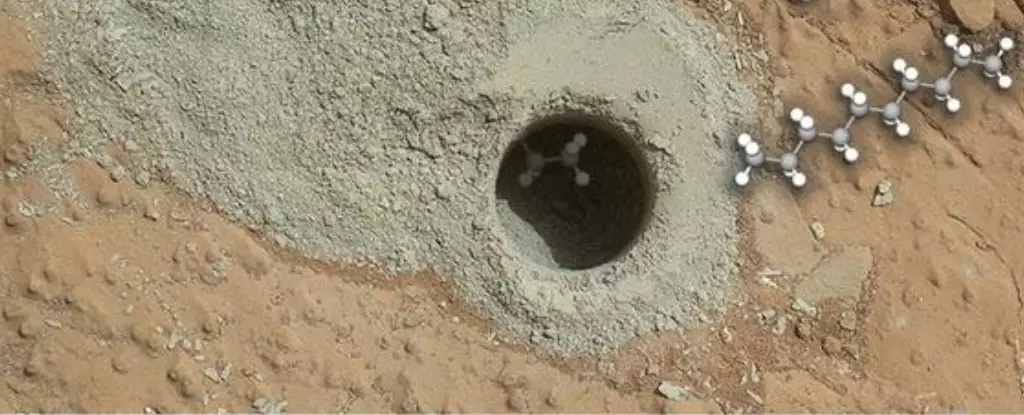In a remarkable stride towards unraveling the mysteries of life beyond our planet, scientists recently unearthed carbon chains lurking in an ancient lakebed on Mars, raising questions that transcend mere curiosity. This breakthrough, stemming from the diligent research conducted by NASA’s Curiosity rover, hints at the possibilities of life that may have existed on the Red Planet millions of years ago. These chains, as long as a dozen carbon atoms, not only expand the inventory of Martian compounds but also serve as pivotal clues to the planet’s previous biosphere.
Led by prominent analytical chemist Caroline Freissinet from the French National Centre for Scientific Research (CNRS), the study exemplifies international collaboration and the fruits of cutting-edge scientific inquiry. This endeavor showcases how advanced technologies can excavate secrets hidden within extraterrestrial samples. The mere existence of these carbon chains prompts a paradigm shift in our understanding of Mars’ geological past—a place once teeming with complex organic chemistry, rather than a barren wasteland as the cold and desolate surface might suggest.
Organic Molecules: Nature or Nurture?
The researchers focused on hydrocarbons, specifically saturated chains of decane, undecane, and dodecane. While the scientists haven’t definitively concluded that these molecules are biogenic—created by life—they do raise compelling hypotheses. The realm of chemical curiosity is teeming with debate: can these carbon constructs stem from non-living processes, or do they hint at a deeper biological legacy that once flourished on Mars? This duality in interpretation opens a Pandora’s box of questions about whether we are witnessing the ghosts of Martian life or merely the aftermath of geochemical processes.
Though some may argue that the potential for abiotic origins of these compounds diminishes their importance, I believe it only enriches the conversation. The complexity of organic molecules across the cosmos raises not only scientific but philosophical questions about life’s adaptability. If organisms could develop independent of Earth-like conditions, what does that say about our conception of life in the universe? There’s a danger, however, in being overly optimistic; the allure of these discoveries could lead to premature assertions that cloud our scientific rigor.
Gale Crater: A Portal to the Past
Curiosity’s longitudinal journey through the Gale Crater has positioned it as a sentinel, uncovering various organic signatures—ranging from chlorinated compounds to nitrates. Each discovery weaves a more intricate narrative about a time when liquid water sculpted the Martian surface, enabling the accumulation of organic compounds. This isn’t merely an academic exercise; it stands as a testament to humanity’s shared endeavor in the search for extraterrestrial life.
If Gale Crater serves as a historical record frozen in time, it is essential to reconsider how we evaluate its data. Are we equipped to interpret these remnants appropriately, especially as sophisticated exploration technologies make their way into our arsenals? Future missions will need to leverage this growing knowledge foundation—a tapestry woven from Mars’ geochemical history—if we hope to answer the age-old question of whether we are alone in the universe.
Beyond the Surface: Future Visions of Mars
While Curiosity has scratched the surface of Martian chemistry, future exploration missions will be critical to unlocking deeper secrets. We must adopt grand aspirations for the kind of technological sophistication needed to explore deeper subterranean layers where life might still exist or at least where more complex compounds could be lying in wait.
Imagine, for a moment, the thrill of discovering evidence of a biological footprint left behind in Martian mudstone; it would not just be a scientific victory, but a profound moment for humanity itself. We would not merely be collectors of data; we would become the architects of a narrative that intertwines our existence with that of another world.
While the quest to decipher the universe’s riddles often yields more questions than answers, there is a refreshing exhilaration in knowing that the interstellar canvas is vast and filled with possibilities. Uncovering life’s echoes on Mars is more than an exploratory mission; it is a call to investigate the shared threads that unite us across the cosmos.


Leave a Reply